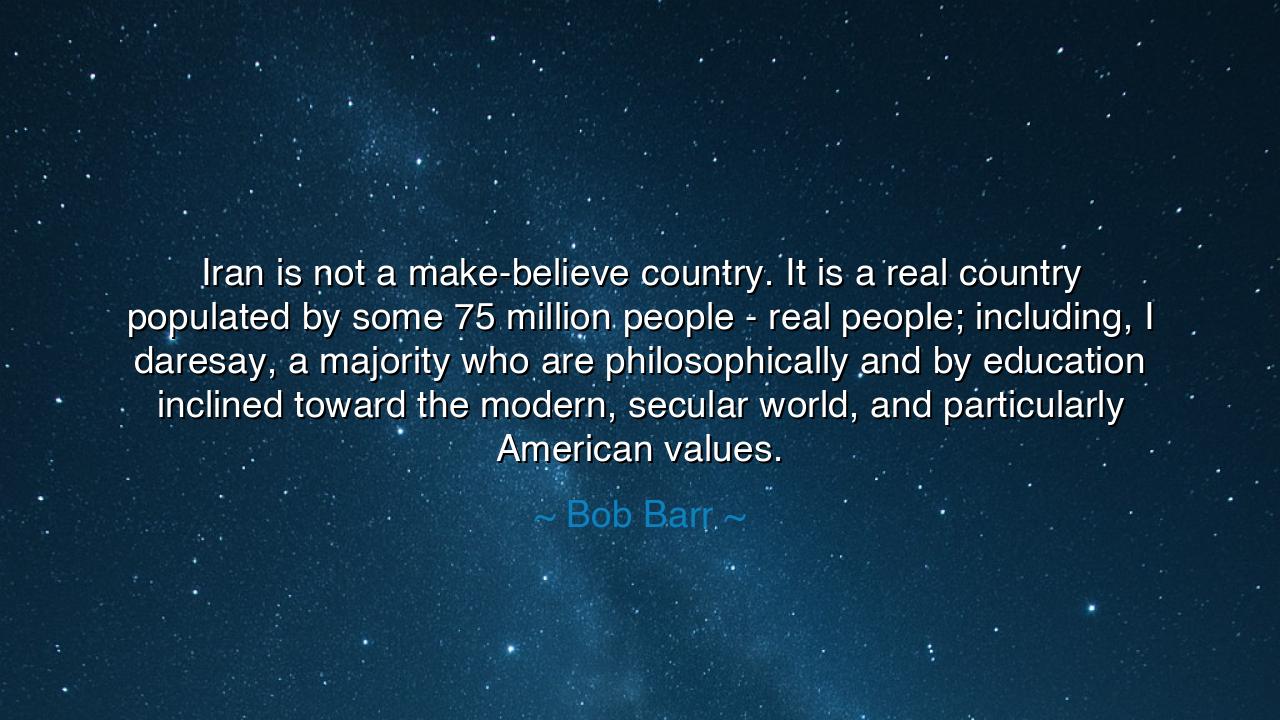
Iran is not a make-believe country. It is a real country
Iran is not a make-believe country. It is a real country populated by some 75 million people - real people; including, I daresay, a majority who are philosophically and by education inclined toward the modern, secular world, and particularly American values.






The statesman Bob Barr once declared with sober clarity: “Iran is not a make-believe country. It is a real country populated by some 75 million people—real people; including, I daresay, a majority who are philosophically and by education inclined toward the modern, secular world, and particularly American values.” These words pierce the veil of illusion and call us back to truth: that nations are not abstractions, not caricatures drawn by propaganda, but living communities of human beings with hopes, struggles, and dreams.
Too often in the councils of power, adversaries are painted as shadows, their citizens invisible behind the mask of ideology. Yet Barr insists: Iran is real. Its men and women are not phantoms of a hostile myth but flesh and blood, mothers and fathers, scholars and workers, children who laugh, lovers who dream. To forget their humanity is to fall into the oldest error of empire—to see enemies where there are only people.
The ancients warned of this blindness. When the Greeks fought the Persians, playwrights like Aeschylus dared to remind Athens that the fallen soldiers of their enemy were not demons but husbands, sons, and brothers, mourned by grieving families. In the same spirit, Barr’s words challenge us to see beyond politics, beyond rhetoric, to the human face of a nation too often reduced to slogans.
It is striking that Barr speaks of a majority inclined by education toward the modern and secular world. This is no empty claim. For Iran, with its poets, scientists, and thinkers, carries a heritage of learning that stretches back to ancient Persia, when scholars preserved knowledge through dark ages and contributed to mathematics, medicine, and philosophy. To imagine such a people cut off from the modern spirit is folly. Barr reminds us that within Iran are countless hearts resonating with values of openness, freedom, and dignity—values often called American, but in truth universal.
The lesson here is not merely geopolitical, but moral. To think of nations as “make-believe,” to reduce millions of lives to enemies or obstacles, is to commit a grave injustice. True leadership requires vision that sees humanity even in those called opponents. For the path to peace, to dialogue, to progress, begins with recognition: they are as real as we are. Their children’s laughter is as bright, their longing for dignity as deep, their thirst for knowledge as insatiable.
Consider also the folly of the opposite path. History shows that when leaders dehumanize others, calamity follows. In the First World War, propaganda painted entire peoples as savages, and so millions were slaughtered in trenches without thought of reconciliation. When the Second World War dawned, entire populations were branded as subhuman, and from this seed grew horrors beyond measure. Barr’s warning stands against such errors: let us not make of Iran a shadow kingdom, but see it as the real country it is, alive with human worth.
For you, O seeker of wisdom, the practical teaching is clear: when you hear of nations, of peoples, of conflicts far away, resist the temptation to see only abstractions. Learn of their poets, their scholars, their traditions. Speak of their people as neighbors in the shared village of humanity. When others reduce them to caricature, remind them—as Barr did—that these are real people, deserving of understanding.
Thus, let the words of Bob Barr endure as a flame against ignorance: “Iran is not a make-believe country.” Neither Iran, nor any nation, is make-believe. Every border holds souls with stories, every enemy hides a human face. And when we remember this, we stand not only against war’s blindness, but for the hope of a world bound together not by fear, but by recognition, respect, and the timeless bond of shared humanity.






AAdministratorAdministrator
Welcome, honored guests. Please leave a comment, we will respond soon